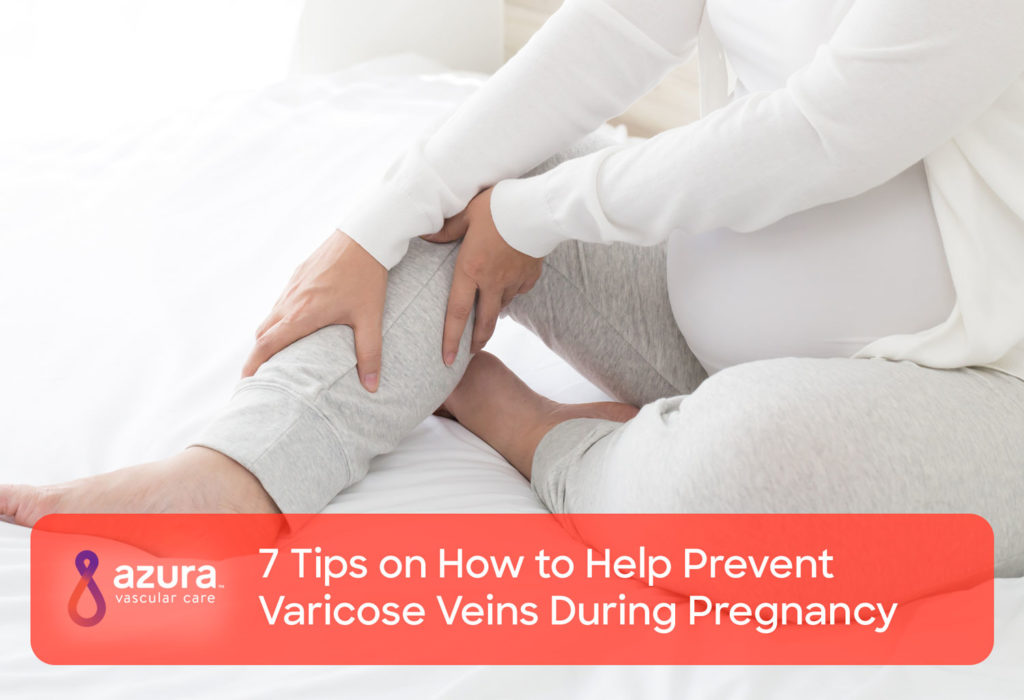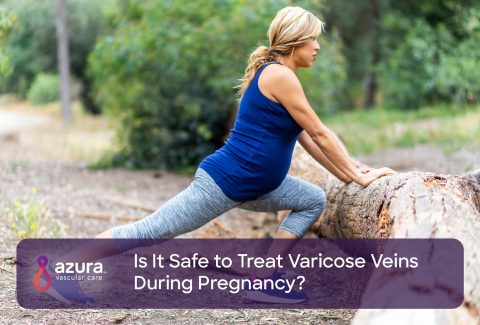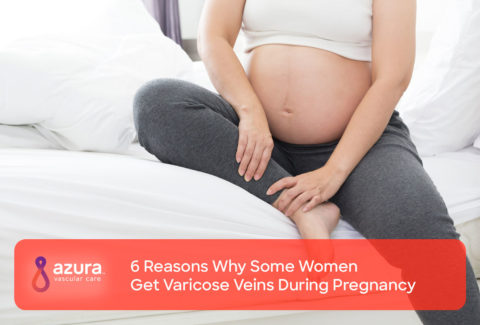
Now that you’re pregnant, are you wondering if you’ll get varicose veins? Did you have varicose veins during your previous pregnancy? Or maybe your sister or mother had varicose veins when they were pregnant and, now you’re wondering how to prevent varicose veins during pregnancy.
Pregnancy does increase the chance that varicose veins will appear on your legs, but there are things you can do to try to prevent them. i
What Are Varicose Veins?
Varicose veins are bulging, twisted veins that usually appear on your legs. They are generally blue or purple and you can feel them right under the surface of the skin.
Veins do not have strong muscles to move blood forward, and they rely on one-way valves and leg muscles to help move blood back to the heart. When the valves are incompetent, blood can build up in the leg veins. This increased pressure forces the walls of the veins to bulge.
If you haven’t already experienced it, pregnancy causes many changes in your body. And some of these changes can cause varicose veins. ii
- Progesterone – This hormone is increased during pregnancy. It is essential for a healthy pregnancy, but it also causes the veins to relax. Blood does not move as easily through these relaxed veins. As blood builds up, the pressure within the vein increases and the vein enlarges.
- Increased blood – The volume of blood in a pregnant woman’s body increases during pregnancy. More blood overall means there is more blood within the veins, and this increases the strain on the vein valves and walls.
- Pressure from the uterus – The growing fetus within the uterus pushes against the organs and blood vessels in the abdomen. Blood moves from the leg veins to veins in the pelvis, or lower abdomen, before moving back to the heart. The pressure placed on these pelvic veins by the uterus prevents blood from flowing out of the legs.
Now that you understand why you’re more likely to get varicose veins when you’re pregnant, let’s look at what you can do to help prevent them.
7 Tips on How to Help Prevent Varicose Veins During Pregnancy
- Keep Moving – It can get harder to move around when you’re pregnant. You may be exhausted or your growing abdomen seems to get in the way. But you need to move your leg muscles to help pump the blood out of your legs. If you have any concerns about walking, talk to your obstetrician to see if there’s a safe way you can keep moving while you are pregnant. ii
- Watch Your Weigh – You can have intense cravings when you’re pregnant, but increased weight puts more pressure on your veins. Of course, weight gain is expected, but you should try to avoid gaining it too quickly. Your obstetrician can help you determine how much weight you should be gaining in between doctor visits. ii
- Take A Load Off – Put your legs up, ideally higher than your heart, throughout the day. Use gravity to help the blood drain out of your leg veins. When you’re in bed, put a pillow under your feet to help the blood drain while you rest. If you stand a lot during the day, try to find time to take breaks so you can sit down and put your feet up. ii
- Wear Maternity Hose – Supportive pantyhose or thigh-high compression stockings work by applying pressure to the outside of your legs. This helps counteract the pressure within the veins and prevents swelling and bulging. You can put them on in the morning, but you should take them off when going to bed each night.ii
- Avoid High Heels – High heels prevent the leg muscles from working, and this keeps the blood in the veins. If you must wear high heels, save them for special occasions and try to wear more flat shoes day to day. iii
- Avoid Crossing Your Legs – Crossing your legs prevents blood from moving out of the veins, which increases the pressure within them.iii
- Choose The Left Side – Sleeping on your left side can relieve the pressure on the veins in your abdomen and help your leg veins drain while you’re sleeping.iii
If you are wondering how to help prevent varicose veins during pregnancy, keep in mind that many of the things you can do to prevent varicose veins will also help relieve their symptoms. Remember that even if you do everything you can to prevent them, you may still get varicose veins during your pregnancy. Take comfort in knowing that varicose veins that appear during pregnancy will most likely resolve within a few months, usually around 3, post-partum. i And if they don’t resolve on their own, there are safe, minimally invasive procedures performed by vascular specialists which treat varicose veins and don’t involve surgery. Talk to your obstetrician about your varicose veins to see if there is anything else you can be doing.
Sources:
i National Heart, Lung and Blood Institute. Who Is at Risk for Varicose Veins? https://www.nhlbi.nih.gov/health/health-topics/topics/vv/atrisk (updated 1/29/2016, accessed 11/30/2016)
ii Mayo Clinic, Varicose veins and pregnancy: Legs and more. http://www.mayoclinic.org/healthy-lifestyle/pregnancy-week-by-week/expert-blog/varicose-veins-and-pregnancy/bgp-20055799 (reviewed 4/10/2013, accessed 12/12/2016)
iii American Pregnancy Association, Treating Varicose Veins Naturally During Pregnancy. http://americanpregnancy.org/naturally/treating-varicose-veins-naturally-during-pregnancy/ (reviewed 9/2/2016, accessed 12/15/2016)


